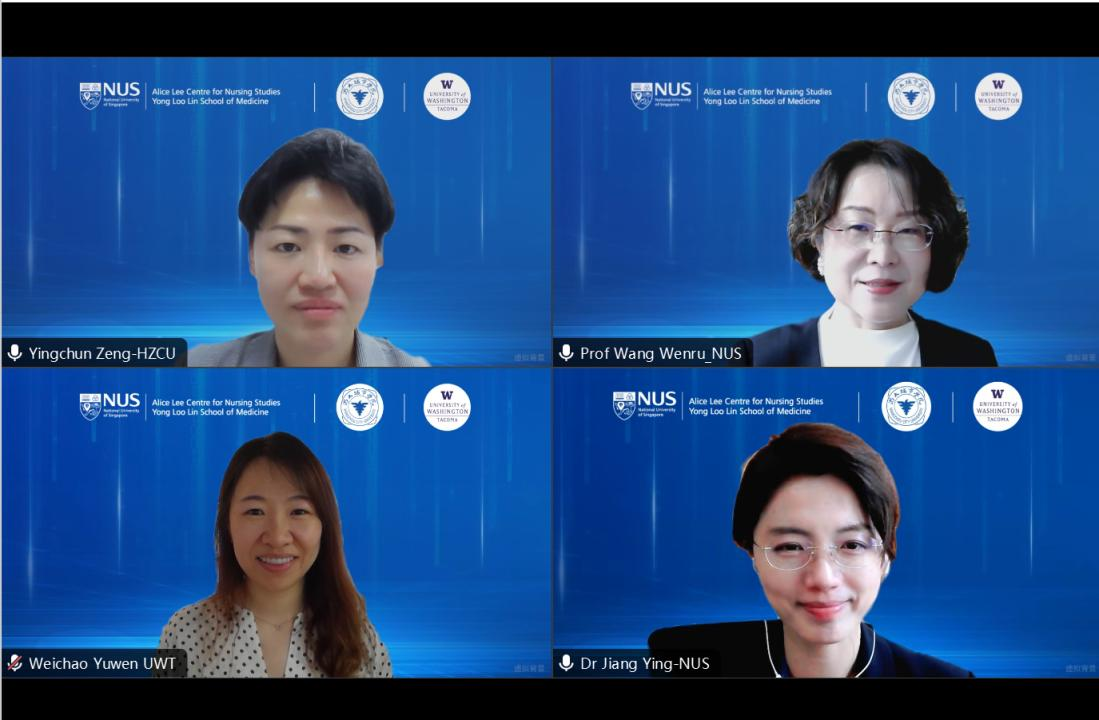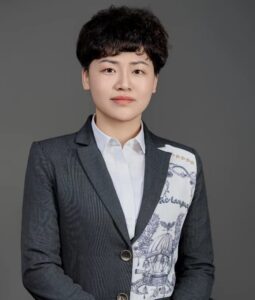News
Insights on how the impact of AI is shaping chronic disease prevention and care: Highlights from the TREND Webinar 2024
8 May 2024

Experts from NUS Nursing, Hangzhou City University & University of Washington gathered to discuss on chronic disease prevention and care
Insights on how the impact of AI is shaping chronic disease prevention and care: Highlights from the TREND Webinar 2024
The first NUS Nursing TREND webinar for this year was successfully held on 27 April 2024, with over 2,000 attendees. The webinar, “From Virtual Assessments to Virtual Exercise: How AI is tailoring Chronic Disease Prevention and Care”, aimed to address the challenges posed by ageing population, particularly in managing chronic diseases and promoting healthy ageing amid resource constraints. Speakers Professor Wang Wenru, Associate Professor Weichao Yuwen, Associate Professor Zeng Yingchun, and Assistant Professor Jiang Ying shared innovative strategies supporting these issues, including the integration of technology, artificial intelligence (AI), extended reality (XR), and immersive educational environments.

Empowering Patients in Singapore with Tech-Driven Healthcare Transformation
As Singapore approaches an era of a “superaged” population, the country needs to cope with a prevalent increase in chronic diseases along with the demands for healthcare resources. Innovative strategies are required to meet the challenges of chronic disease management and ageing in the face of resource scarcity. One strategy is the use of technology to empower patients in care, to transition the management of diseases and health-promoting lifestyle behaviours from the acute hospitals to the community. Presently, there are a number of digital health interventions integrated into the healthcare infrastructure in Singapore. The acceptance of these digital health solutions by the elderly opens up research opportunities to explore how technology can contribute to health promotion and disease self-management. In Prof Wang’s presentation, she shared how the novel integration of digital health solutions with the healthcare team embodies a human-digital-lifestyle partnership, which can potentially reduce manpower demands, improve the uptake and adherence of healthy lifestyle behaviours, as well as promote disease self-management.

Artificial Intelligence’s Impact on Family Caregiving
A/Prof Weichao Yuwen from the University of Washington explored the intricacies of artificial intelligence (AI) during the webinar. Beginning with definitions, she discussed various facets of AI, including generative AI, and examined the significance of Natural Language Processing (NLP) within the AI landscape. Highlighting recent strides in large language models, A/Prof Yuwen shed light on the evolving landscape of AI technologies. Moreover, she generously shared insights from her research, particularly focusing on leveraging these technologies to bolster family caregiving. Additionally, A/Prof Yuwen engaged the audience with discussions on potential future research avenues in this domain.

Exploring the Boundless Realms of XR: Revolutionising Nursing Research and Education
A/Prof Zeng Yingchun from Hangzhou City University provided an insightful exploration into the world of XR technologies during the webinar. Her presentation focused on the transformative applications of immersive extended reality (XR) in nursing research and education. Offering a comprehensive overview, A/Prof Zeng detailed the various facets of XR, including Augmented Reality (AR), Virtual Reality (VR), and Mixed Reality (MR), and their profound implications for cognitive assessment and rehabilitation. Notably, she underscored VR’s unique advantages in delivering consistent and controlled stimuli for cognitive assessments, thereby enhancing diagnostic accuracy and treatment effectiveness, particularly among cancer patients and the elderly with mild dementia.
Furthermore, A/Prof Zeng delved into the potential of the metaverse in constructing immersive educational environments tailored for nursing students. By seamlessly integrating virtual and real interactions, these environments offer students a holistic understanding of medical procedures and patient care practices. A/Prof Zeng’s presentation not only elucidated the practical applications of XR in healthcare but also highlighted its role in shaping the future of nursing research and education.

Dancing Towards Better Health: SinDance Exergame for Older Adults Shows Promise in Fall Prevention
Asst Prof Jiang Ying introduced SinDance, a specially tailored dance-based exercise game developed in Singapore, aimed at improving physical abilities and preventing falls in older adults. This innovative approach was put to the test in a pilot study, which confirmed its safety and viability, setting the stage for further investigation. Recognising the importance of preventing falls and promoting physical activity in older individuals, Asst Prof Jiang and her team sought to address existing challenges in similar exergames. Through a 6-week trial, conducted in collaboration with Singapore Lions Befrienders’ centres, they evaluated the effectiveness of SinDance among individuals aged 60 and above. Participants were randomly assigned to either engage in three weekly sessions of SinDance or continue with their usual activities. The results of this pilot study indicated that SinDance is not only feasible but also safe for older adults. Building on these promising findings, plans for a more extensive trial are already in motion.
View the full webinar here: https://uzjuu.xetsl.com/sl/2ejgYv


